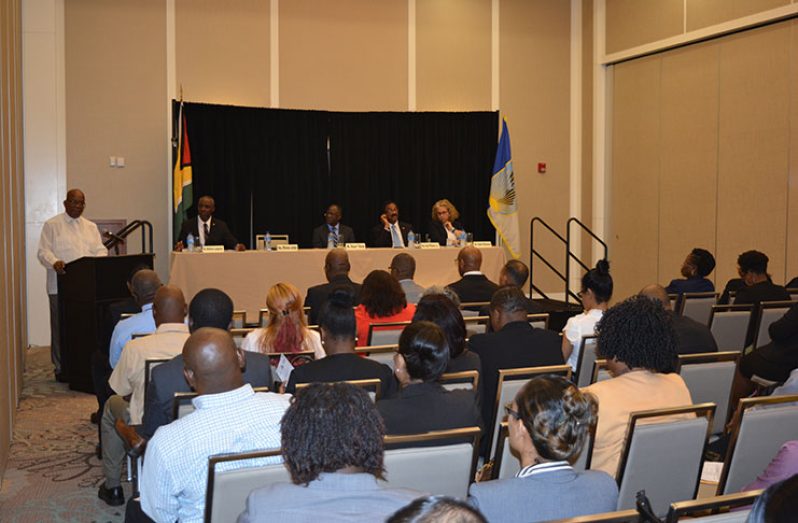–Finance Minister
MONEY laundering has a corrosive effect on a country’s economy, investments and social well-being and requires an anti-money laundering framework for protection of the integrity and economic stability of Guyana’s financial institutions.
This perspective was shared by Finance Minister,Winston Jordan,who was at the time addressing the opening of a final two-day workshop on Money Laundering and Financing of Terrorism (ML/FT) and National Risk Assessment (NRA) on Wednesday at the Marriot Hotel.
The workshop was organised by the World Bank, the Inter-American Development Bank (IDB) and the Legal Affairs Ministry. The National Assembly in 2015 passed the Anti-Terrorism and Terrorist Related Activities Bill, the AML/CFT (Amendment) Bill Number 1 and 2, and the AML/CFT Regulations.
The Finance Minister said the workshop will better enable policy makers to understand and identify financial threats and vulnerabilities across the economy.
Minister Jordan said Guyana’s geographic location, porous borders, international imports and the cash-based economy makes the country vulnerable to money laundering and terrorist financing.
He said money laundering is now shifting to more trade-related activities and Government is cognisant of the macroeconomic effect if left unattended, which can affect the stability of the financial systems. The minister said this can promote corruption and a lack of confidence in the economy while negatively affecting investments and ultimately retard economic growth.
He underscored that Government has been making stringent efforts to strengthen the country’s AML bills through appropriate enactments and amendments to relevant laws.
CONTINUED VIGILANCE
“Even though we have made significant progress over the last two years with enhancing the AML regime, we have effectively implemented many global standards and we will continue to be vigilant and move with alacrity to enact the relevant legislation to address new threats and vulnerabilities,” the Finance Minister noted.
He said the NRA working group has completed a comprehensive analysis of Guyana’s ML/FT and the national action plan that is prepared by the teams will form the basis of sufficient allocation of the country’s financial resources.
Adding that many developing countries including those in the Caribbean are adversely affected by global banks de-risking practices, the finance minister said there are banking institutions that have completely loss or reduced relationships with corresponding banks which creates difficulties involving the trade of goods and services, including remittances.
He explained that an efficient anti-money laundering regime will protect countries from the severity of the de-risking practices and sustain a level of development in respective countries.
“Guyana is on a mission to enhance financial inclusion to promote poverty reduction and national development. And so, I was happy to learn that financial inclusion was aptly addressed during the NRA exercise, because this Government wants to ensure that regulations do not unintentionally exclude businesses and individuals from the formal financial system, but instead, measures can be relaxed when financial products are not considered high risk,” he noted.
Meanwhile, Attorney General and Legal Affairs Minister,Basil Williams said Guyana is in the fourth round of assessment and it entails and requires total commitment with all the relevant stakeholders.
WEAKNESSES OBSERVED
He said companies will come under the microscope as many weaknesses within the sector have been observed. One of the most serious microeconomic effects of money laundering is felt in the private sector.
Money launderers often use front companies, which co-mingle the proceeds of illicit activity with legitimate funds, to hide the ill-gotten gains.
According to the Attorney General, when left unchecked, money laundering can erode the integrity of a nation’s financial institutions. Due to the high integration of capital markets, money laundering can also adversely affect currencies and interest rates.
Ultimately, he said, laundered money flows into global financial systems, where it can undermine national economies and currencies.
Williams said the state and all its law enforcement arms will have to collaborate in the exchange of information to ensure anti-money-laundering efforts, which are designed to prevent or limit the ability of criminals to use their ill-gotten gains, are both a critical and effective component of anti-crime programmes.
Among those in attendance at the workshop include Financial Intelligence Unit (FIU) Director,Matthew Langevine;Senior Financial Sector Specialist of the World Bank,Stuart Yikona;IDB Country Representative,Sophie Makonnen, and acting Chancellor of the Judiciary, Madame Justice Cummings Edward.


.jpg)











